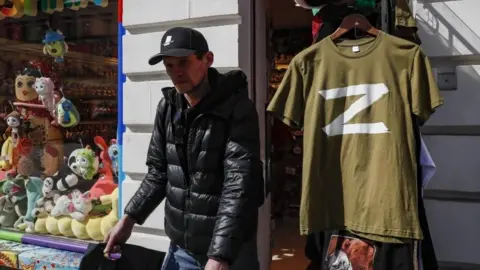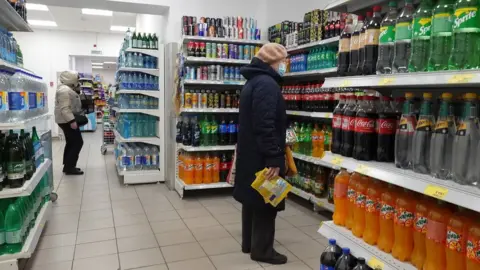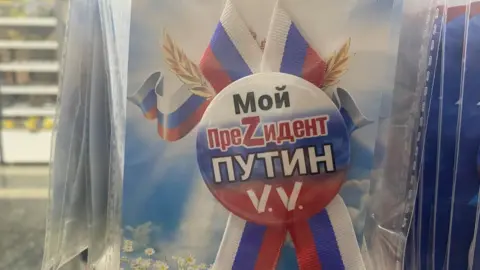Ukraine war: The Russia I knew no longer exists - Steve Rosenberg
 EPA
EPAThere are no shells exploding in Moscow. There are no foreign forces encircling the city. What Muscovites are experiencing now is nothing compared to the horrors in Ukraine.
At first glance life here even looks normal. As usual, Moscow's Garden Ring is packed with traffic. Crowds are streaming from the metro station opposite me.
In reality, though, little here could be described as normal. Normality ended on 24 February when Vladimir Putin ordered his troops into Ukraine for his "Special Military Operation".
I have experienced Communist Russia. I have lived through post-Soviet Russia. Now the world's largest country has metamorphosed again.
Let me take you on a tour of "Special Military Operation Russia".
I get in the car to drive to the supermarket. By force of habit, I switch on the radio. It's tuned to 91.2 FM - once the home of Radio Echo of Moscow. Echo was my favourite Russian radio station - a reliable source of news and information.
But in recent weeks all independent Russian news outlets have either been blocked or shut down. Broadcasting now on 91.2 FM is state-run Radio Sputnik, which backs the Russian offensive in Ukraine.
Driving along the Garden Ring, I pass a theatre which has erected on its façade a giant Latin letter Z - the symbol of Russia's military operation. There's another Z outside the headquarters of Russian Railways. I overtake a lorry that has a Z sticker on the side. In recent weeks Zs have been graffitied on the front doors of Kremlin critics.
At the shopping mall, business is far from booming. Many of the shops - international brands - have shut down. Since Russian forces attacked Ukraine, hundreds of foreign companies have suspended operations in Russia.
Doctor's salary not enough
In the supermarket, the shelves are full. Last month's sugar shortage in Russia - the result of panic buying - appears to have been resolved. But the range of products seems smaller than before. And over the last two months prices have shot up.
Outside the shopping centre, I get chatting to Nadezhda, a doctor.
"Prices are so high, it's impossible to survive now on my salary," Nadezhda tells me.
 EPA
EPA"But the hardest thing of all is living in a society that doesn't want to know the truth about events in Ukraine. People are too busy worrying about their mortgage payments, paying off their debts. They're not interested in what's going on around them. But I think that what's happening in Ukraine is terrible. I'm ashamed to be Russian."
I drive to the Moscow engineering institute where, 30 years ago, I used to teach English.
Back in the early 1990s, after the fall of communism, my students here were full of hope that Russia and the West would forge a lasting friendship and partnership; that the future would be peaceful and prosperous.
That didn't work out.
"We'll overcome all our difficulties. After sunset always comes the dawn," says Denis, a student, outside the institute.
"But I support our troops. They are our soldiers. I am obliged to support my country come what may."
Orwellian distortions
My final destination is the giant war museum that celebrates the Soviet Union's victory over Nazi Germany in World War Two - a glorious victory, achieved at enormous human cost. More than 27 million Soviet citizens were killed in what is known here as the Great Patriotic War.
What I find disturbing is how the "Special Military Operation" has found a place in this museum, how it's being honoured here.
On the museum's website, the spelling of the word "museum" has been altered to feature the letter Z. In the museum shop you can buy Z mugs and badges declaring "Putin is My PreZident".

And the museum is currently hosting an exhibition about Nazis in Ukraine. That helps to cement the Kremlin's bogus claim that the Russian army is liberating Ukraine from Nazism.
This is "Special Military Operation Russia" - a parallel universe, Orwellian, where invasion is liberation, where aggression is self-defence and where critics are traitors.
It feels like the Russia I have known for the last 30 years has gone.

War in Ukraine: More coverage
- EXPLAINED: Why Russia wants eastern Donbas
- IN MAPS: Tracking the invasion
- UKRAINE: Where have millions of refugees gone?
- READ MORE: Full coverage of the crisis
